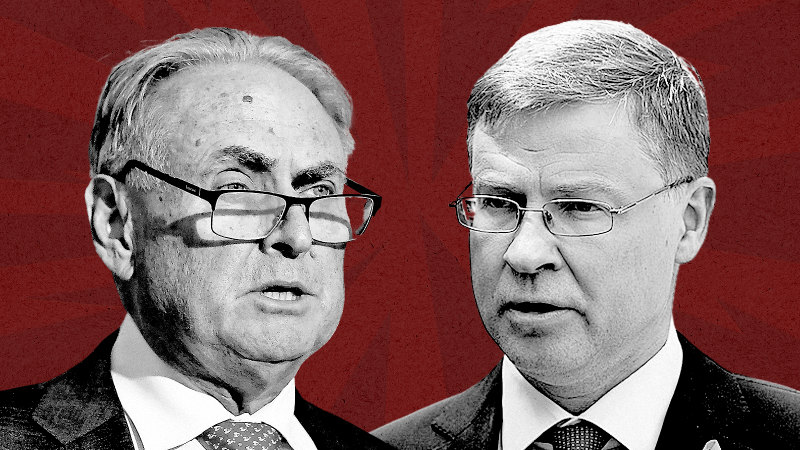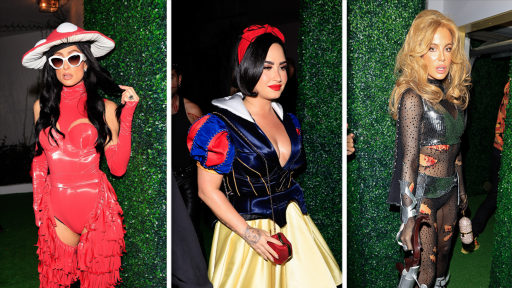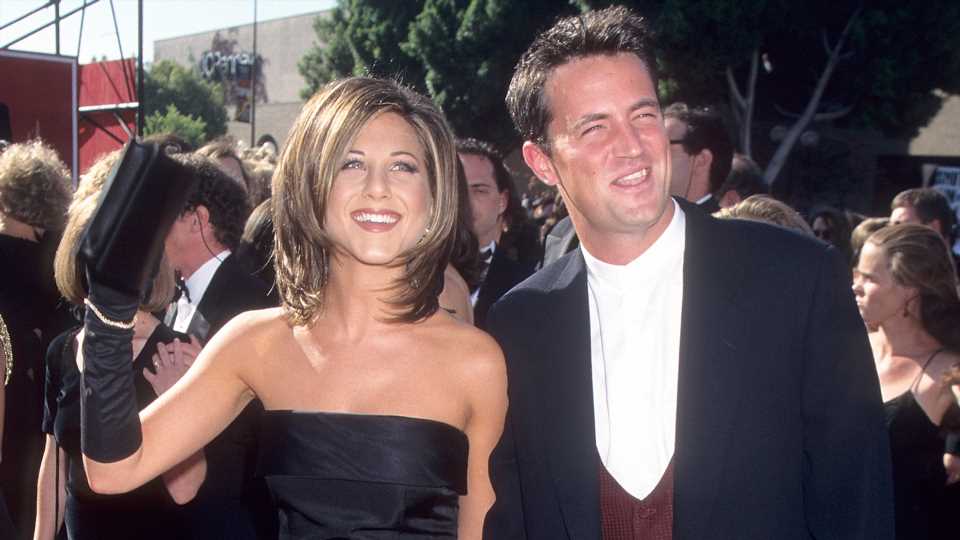Save articles for later
Add articles to your saved list and come back to them any time.
A last-ditch attempt to secure a free trade agreement with the European Union over better access for Australian meat and protections for continental goods has fallen apart before the “end game” negotiations could start, a move that will set any deal with the bloc back years.
Trade Minister Don Farrell has been in Japan for trade minister G7 meetings and was expected to attend ministerial-level meetings on Monday to negotiate a free trade agreement before the EU heads into elections early next year.
However, informal discussions between the parties stalled in Osaka on Sunday evening when it became clear not enough compromise had been made.
Talks between Trade Minister Don Farrell and EU’s Valdis Dombrovskis have fallen apart.Credit: Aresna Villanueva
“We weren’t able to make progress,” Farrell said. “Negotiations will continue, and I am hopeful that one day we will sign a deal that benefits both Australia and our European friends.”
Before the meeting, Farrell held hopes he and European Commission executive vice-president Valdis Dombrovskis could reach a deal.
“If the offer is the same as what it was in July, then I’ll have no qualms about walking away as I did then,” he told this masthead.
“I’m not going back simply to hear a repeat of the previous offer. I want to get a better offer.”
The European Union will shortly enter an election season, and Farrell said if there was no deal on Monday the negotiations would have to be put on ice, potentially for several years.
“The way the Europeans approached this is they described it as the ‘end game’ … [Dombrovskis] wants an agreement too, I’m in no doubt about that. But we’re just not there.”
Negotiations stalled in July when Farrell left Brussels negotiations without an agreement after the two parties failed to reach a compromise on major sticking points, including greater European market access for Australian beef and sheep meat products and name protections for European products.
Farrell said after the July failure there were two choices: break off negotiations altogether, or take a break and review positions to see whether there was another opportunity to reach an agreement.
He said after consulting groups including the National Farmers Federation and Meat and Livestock Australia, it was clear local producers wanted him to keep talking, but what the Europeans had been offering so far was not acceptable.
“It’s just not good enough. We’ve been trying, including in the period between July and now to get a better offer, and that hasn’t come,” he said.
Work on a free trade agreement began in 2018 but was shelved by the European Union in 2021 after Australia took France by surprise by cancelling a submarine contract with Naval to instead take up a deal for US nuclear submarines through the AUKUS agreement.
Australia’s resistance to demands from Europe over outlawing the use of names such as prosecco and feta because they are geographical indicators remains a significant barrier to a trade dealCredit: maurese
France and Ireland in particular have been opposed to allowing greater market access for Australian meat producers, while Australian producers do not want a deal without better access to European markets.
National Farmers’ Federation president Fiona Simson said last week there was no Australian agriculture sector that was getting a good deal under what Europe was currently offering.
“We need a deal to make everyone better off. It just looks like the EU is getting more of what they wanted, and we’re getting less,” she said at the National Press Club last Tuesday.
The other major sticking point has been naming protections for European food and beverage products — known as geographic indicators — which if accepted by the federal government force Australian businesses to change the names of locally produced goods including feta, parmesan and prosecco to protect European naming rights.
“My objective is to try and get the best result on agriculture, but also do my best to protect those names [for Australian producers],” Farrell said.
The bloc also wants Australia to scrap the luxury car tax, to give manufacturers including BMW, Volkswagen and Citroën more competitive access to the Australian vehicle market.
Farrell said Australia could do something in that space, particularly for electric vehicles, but only if the Europeans come to the table with a better offer on agricultural market access.
“That could be part of a final package deal, but again, it’s got to be related to what sort of offer we get for our agricultural products,” he said.
The European Union is already Australia’s largest two-way trading partner, but with about 446 million people and a total market value of about $24 trillion last year it offers significant opportunities for Australian businesses.
But Farrell said the deal was about much more than the flow of goods, and in an era of international instability Europe should also consider the geostrategic benefits of having closer ties with Australia.
The Morning Edition newsletter is our guide to the day’s most important and interesting stories, analysis and insights. Sign up here.
Most Viewed in Politics
From our partners
Source: Read Full Article




